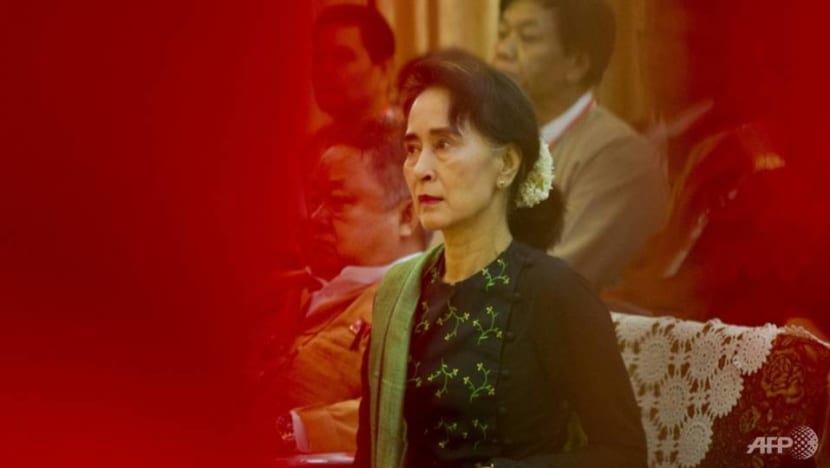Aung San Suu Kyi confronted with sedition charge on 2nd day of trial

Aung San Suu Kyi has been hit with a raft of charges by Myanmar's military junta. (File photo: AFP/STR)
NAYPYIDAW: The trial of Myanmar’s deposed leader Aung San Suu Kyi entered its second day on Tuesday (Jun 15), with the prosecution presenting arguments that she incited public disorder and flouted COVID-19 restrictions, part of a package of charges that the ruling junta is seen as using to discredit her and consolidate its control.
Aung San Suu Kyi and other members of her government and party were arrested by the military after the Feb 1 coup, with criminal charges brought against some of the top figures that both their supporters and independent observers say are bogus.
The coup reversed years democratic reforms in Myanmar after decades of military rule and sparked widespread protests and international condemnation.
Aung San Suu Kyi and her National League for Democracy (NLD) party had been due to start a second five-year term in office after winning a landslide victory in a general election last November.
Aung San Suu Kyi has not been seen in public since her arrest, and her lawyers say they don't know exactly where she is currently being held. She has also had only limited time to consult with her legal team.
READ: Junta trial of Myanmar's Aung San Suu Kyi to hear first testimony
READ: Myanmar authorities open new corruption cases against Aung San Suu Kyi
Tuesday’s session was to cover a sedition charge brought against Aung San Suu Kyi, along with a second count of violating COVID-19 restrictions.
The sedition charge, which is sometimes described as incitement, calls for up to two years’ imprisonment for anyone found guilty of causing fear or alarm that could cause an offence against the state or public tranquillity.
The offence has been law since Myanmar was a British colony, and has been criticised as a catch-all statute that infringes on freedom of speech and is used for political repression.
The trial, which is closed to the public and media, opened on Monday in the capital Naypyidaw, with police outlining several of the cases against her.
They covered charges that she had illegally imported walkie-talkies that were for her bodyguards’ use; the unlicensed use of those radios; and the violation of the Natural Disaster Management Law by allegedly breaking pandemic restrictions during last year’s election campaign, her lawyers said.
The court also heard a case against ousted president Win Myint, for violating the pandemic restrictions.
Aung San Suu Kyi also faces more charges that have yet to go to trial, among them for allegedly accepting bribes.
Some of the charges carry potential penalties as high as 15 years in prison. But a conviction on virtually any could result in Aung San Suu Kyi being banned from running in any future election, which many believe is the military’s goal.
READ: Former head of Myanmar's COVID-19 vaccination programme arrested
READ: Myanmar junta media accuse Karen armed group of killing 25 workers
One of the military's justifications for the coup was that last year's election was marred by fraud, an assertion rejected by independent poll watchers.
Aung San Suu Kyi's trial has renewed calls for her release and return to civilian rule.
United Nations deputy spokesman Farhan Haq, responding to a question on Secretary-General Antonio Guterres’ reaction to the trial, said on Monday that the UN position is clear: “We want her and all of the senior members of her administration to be freed.”
“The secretary-general has called for and continues to call for a reversal of the Feb 1 coup and the restoration of the legitimate government of Myanmar, of whom Aung San Suu Kyi is a member,” Haq said.
Rights groups have said that there is little chance that Aung San Suu Kyi will receive a fair trial.
Phil Robertson, deputy Asia director of Human Rights Watch, said that the pandemic charges are related to cases during the campaign where crowds came to see Aung San Suu Kyi or she greeted them, and noted that the military had not enforced such regulations for gatherings sympathetic to, or organised by them.
“Public health measures should not be applied in an arbitrary fashion,” he said. “Clearly there are double standards being applied in the prosecution of Aung San Suu Kyi.”












